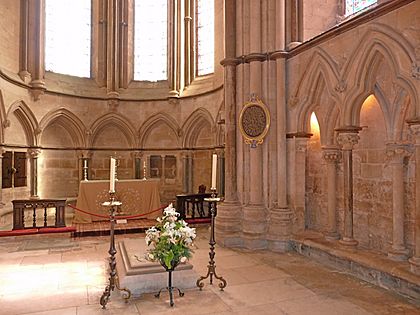Robert Grosseteste facts for kids
Quick facts for kids Robert Grosseteste |
|
|---|---|
| Bishop of Lincoln | |
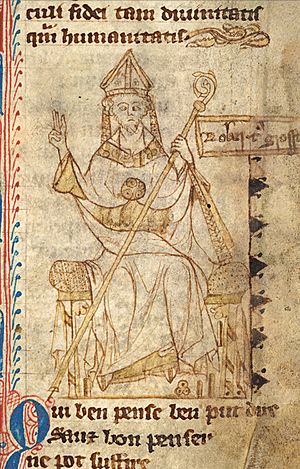
An early 14th-century portrait of Grosseteste
|
|
| Enthroned | 1235 |
| Reign ended | 1253 |
| Predecessor | Hugh of Wells |
| Successor | Henry of Lexington |
| Personal details | |
| Born | c. 1168 Stow, Suffolk |
| Died | 8 or 9 October 1253 (aged about 78) Buckden, Huntingdonshire Philosophy career |
| Era | Medieval philosophy |
| Region | Western philosophy |
| School | Scholasticism |
|
Main interests
|
Theology, natural philosophy |
|
Notable ideas
|
Theory of scientific demonstration |
|
Influences
|
|
|
Influenced
|
|
Robert Grosseteste (born around 1168 – died 8 or 9 October 1253) was an important English thinker. He was also known as Robert Greathead or Robert of Lincoln. He was a statesman, a scholastic philosopher, a theologian (someone who studies religion), and a scientist. He also served as the Bishop of Lincoln.
Robert Grosseteste was born into a humble family in Suffolk, England. After he died, many people in England thought of him as a saint. However, attempts to officially make him a saint were not successful. Many historians believe he was a key figure in developing scientific thought in medieval Oxford.
Contents
Robert Grosseteste's Early Life and Studies
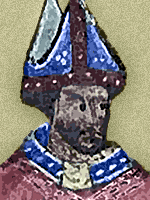
We don't know much about Robert Grosseteste's early education. He might have studied the liberal arts in Lincoln. By the late 1180s or early 1190s, he was known as a "Master," meaning he had completed his studies.
Around 1195, he worked for the Bishop of Hereford, William de Vere. A famous writer named Gerald of Wales even wrote a letter praising Grosseteste's skills. After Bishop William died in 1198, Grosseteste's path becomes less clear for a while. He might have spent some time in France.
By 1225, he became a deacon and received an important church position called a benefice in Abbotsley. Some historians think he started teaching theology at the University of Oxford around this time. Others believe he used his income to study theology in Paris.
However, it's clear that by 1229 or 1230, he was teaching at Oxford. He was a theology teacher for the Franciscans, a group of monks who had a convent in Oxford. He taught there until March 1235.
Grosseteste might also have been the Chancellor of the University of Oxford. This means he would have been the head of the university.
Around the same time he taught at Oxford, the Bishop of Lincoln, Hugh of Wells, made him the Archdeacon of Leicester. He also became a canon in Lincoln Cathedral. But after getting very sick in 1232, he gave up most of his church positions. He only kept his position as a canon. He did this because he felt it was wrong to hold too many church jobs at once.
As a teacher of theology, Grosseteste taught the Franciscans about religious texts. His most famous student was Roger Bacon, who learned a lot about the scientific method from him. Grosseteste lectured on many parts of the Bible, including the Psalter, the Pauline epistles, and the creation story from Genesis. He also led discussions on topics like truth and religious laws.
His writings show that he was always interested in the natural world. He used it to think about religious ideas. He could also read Greek.
Robert Grosseteste as Bishop of Lincoln
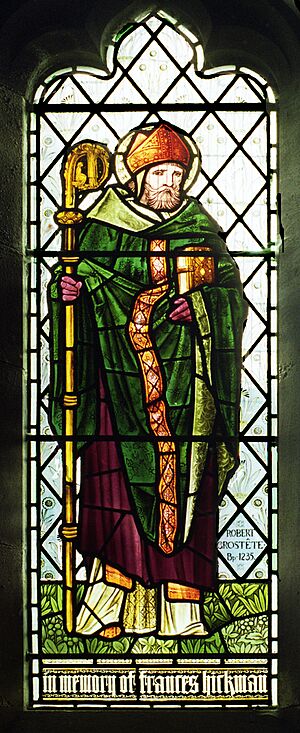
In February 1235, Bishop Hugh of Wells died. The canons (priests) of Lincoln Cathedral met to choose a new bishop. They couldn't agree, so they chose Grosseteste as a compromise. He became Bishop in June of that year.
As bishop, he started a new way of inspecting churches and monasteries. This was called a "visitation." He expanded it to include all the areas in his large diocese. This caused some disagreements, especially with his own cathedral chapter (the group of canons). They didn't think he had the right to inspect them. This argument lasted from 1239 to 1245. In 1245, the Pope's court decided that Grosseteste was right.
Grosseteste was a strong supporter of the church's rights. He sometimes disagreed with King Henry III about these matters. He believed that a bishop should always follow the Pope's commands. However, he also stood up for the English church when it disagreed with Rome.
For example, in 1238, he asked the King to release some Oxford scholars. They had attacked a papal representative. In 1244, he helped stop the King from separating the clergy (church officials) from the nobles when the King asked for money. Grosseteste said, "It is written that united we stand and divided we fall."
Later in his life, Grosseteste had a conflict with the new Archbishop of Canterbury, Boniface of Savoy. In 1250, he went to the Pope's court. He complained that Boniface was harming the church. He also said the Pope was partly to blame for not stopping him. The Pope agreed with most of Grosseteste's ideas about how the English church should work.
Grosseteste continued to watch church events closely. In 1251, he protested against the Pope's order for the English clergy to pay King Henry III money for a crusade. He also pointed out that a lot of money was leaving England because the Pope was appointing foreign clergy.
In 1253, when he was told to provide a position for the Pope's nephew in his diocese, he refused. He wrote a strong letter explaining his refusal. He argued that the Pope should only be obeyed if his commands followed the teachings of Christ.
Grosseteste was good friends with the Franciscan teacher, Adam Marsh. Through Adam, he became close with Simon de Montfort. Simon de Montfort was a powerful earl who was interested in Grosseteste's ideas about good government. Grosseteste believed that the King's bad rule and his agreements with the Pope were causing problems for the English church.
Robert Grosseteste's Death and Burial
Robert Grosseteste died on 9 October 1253. He was between 70 and 80 years old.
He is buried in a special chapel inside Lincoln Cathedral. His tomb has a plaque that tells about his life. It says he was a man of great learning and a wise leader. It also says he cared deeply for his followers and tried to balance justice with mercy.
After his death, a story spread that Grosseteste's ghost visited Pope Innocent IV and caused his death. This story was told for a long time.
Robert Grosseteste's Legacy
Grosseteste was already famous when he became a bishop. As a church leader, he showed great passion. However, many modern writers focus more on his political work. His own contemporaries, like Matthew Paris and Roger Bacon, saw him differently. They knew he had a strong personality, but they also saw him as a leader in science and learning.
They believed he was the best mathematician and physicist of his time. He had ideas in these fields that Roger Bacon later made more widely known.
Bishop Grosseteste University in Lincoln is named after him. This university trains teachers and offers many degrees. In 2003, it held a conference to celebrate the 750th anniversary of his death.
Grosseteste is recognized for his knowledge and contributions to science. He was listed among "famous and illustrious" scholars in a book by John Evelyn. In 2014, a group called The Robert Grosseteste Society asked for a statue to be built to honor his achievements.
Robert Grosseteste's Writings
Grosseteste wrote many early works in Latin and French. One of these was Chateau d'amour, a poem about the creation of the world. He also wrote other poems and texts on managing a household.
He wrote many important theological works, including the influential Hexaëmeron in the 1230s. He also wrote guides on how to care for people in churches and monasteries.
From about 1220 to 1235, he wrote many scientific books, including:
- De sphera: An introduction to astronomy.
- De luce: About the "metaphysics of light." This is considered a very original work about how the universe began in the Latin West.
- De accessu et recessu maris: About tides and how they move.
- De lineis, angulis et figuris: About using mathematical reasoning in natural sciences.
- De iride: About rainbows.
- De colore: About color.
In 1242, Grosseteste learned about a Greek text called the Testament of the Twelve Patriarchs. He had it brought from Greece and translated into Latin with help from a clerk. He believed it would help strengthen Christian faith.
He also wrote many comments on the works of Aristotle. This included the first Western commentary on Posterior Analytics. He also worked on Pseudo-Dionysius the Areopagite's Celestial Hierarchy, translating it from Greek and writing his own comments.
Robert Grosseteste's Scientific Ideas
Grosseteste is most famous for his original ideas about what we now call science or the scientific method.
He played a key role in developing the scientific method. He introduced the idea of a "controlled experiment" to the Western world. This is a way of testing ideas to gain knowledge. Even though he didn't always follow his own advice, his work was very important for the history of Western science.
Grosseteste was the first of the Scholastics to fully understand Aristotle's idea of scientific reasoning. This involves two steps:
- Generalizing: Taking specific observations and turning them into a general rule or law.
- Predicting: Using those general laws to predict what will happen in specific situations.
Grosseteste called this "resolution and composition." He said that both steps should be checked with experiments. These ideas were very important and influenced later scientists like Galileo Galilei.
Grosseteste also had an important idea called the "subordination of the sciences." This means that some sciences depend on others. For example, optics (the study of light) depends on geometry. So, optics is "subordinate" to geometry. He believed that mathematics was the most important science because all natural sciences ultimately depended on it. He thought this because he believed light was the basic form of everything. Since light could be explained using lines and points (mathematics), mathematics was the highest science.
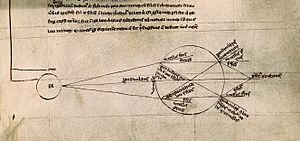
Grosseteste read many important works that were translated from Greek and Arabic. These included works by Euclid, Aristotle, and Avicenna. Using these sources, Grosseteste did important work in optics. His student, Roger Bacon, continued this work and often said how much he learned from Grosseteste.
Grosseteste is now thought to have had a very modern understanding of light and color. This is shown in his scientific writings, De Luce (On Light) and De Colore (On Color).
In De Luce, he explored the nature of light, matter, and the universe. He believed that light was an incredibly tiny particle. He thought it was the first form of everything in the universe. He described the birth of the Universe as an explosion. He also thought that light turned into matter to form stars and planets. He even suggested that as light expanded the universe, its density would decrease. This idea was similar to modern conservation laws, centuries before they were fully understood. De Luce was the first attempt to describe the heavens and Earth using the same physical laws. This was four centuries before Isaac Newton proposed gravity and seven centuries before the Big Bang theory.
In his book De Colore, Robert Grosseteste said that color is light mixed into a clear material. This means that color comes from how light interacts with different materials. He changed Aristotle's simple idea of color (a line between black and white) into a three-dimensional model. This model had 7 different directions of color from white to black, with endless variations in how strong the colors were.
Scientists and historians at Durham University study medieval science. They see Grosseteste as a key figure who showed that science before the Renaissance was much more advanced than people used to think.
Some supposed mistakes in his ideas about light were found to be based on bad copies of his essay De Luce, written around 1225. In 2014, his 1225 book De Luce was translated from Latin and studied by a team from Durham University. This team included experts in Latin, history, physics, and cosmology.
Robert Grosseteste's Veneration
After he died, almost everyone in England thought of Robert Grosseteste as a saint. People reported miracles at his tomb, and pilgrims who visited were given special religious benefits by the Bishop of Lincoln. However, attempts by bishops, the University of Oxford, and King Edward I to officially make him a saint were not successful. This was likely because he had opposed Pope Innocent IV. There was also a rumor that Grosseteste's ghost was responsible for the Pope's death.
In most modern Anglican churches, Robert Grosseteste is considered a blessed person. He is remembered on 9 October in the Church of England and the Episcopal Church.
See also
 In Spanish: Roberto Grosseteste para niños
In Spanish: Roberto Grosseteste para niños
- Brazen head
- Greyfriars, Oxford
- History of science in the Middle Ages
- History of the scientific method
- List of bishops of Lincoln and precursor offices
- List of Roman Catholic scientist-clerics
- Oxford Franciscan school
 | Percy Lavon Julian |
 | Katherine Johnson |
 | George Washington Carver |
 | Annie Easley |


